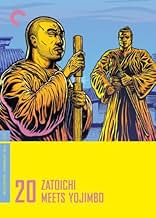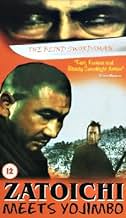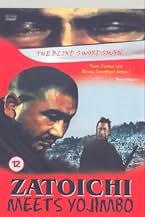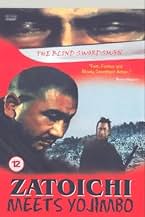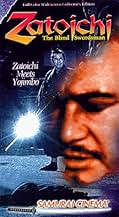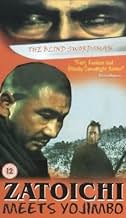La légende de Zatoïchi: Zatoïchi contre yojimbo
Titre original : Zatôichi to yôjinbô
NOTE IMDb
7,0/10
3 k
MA NOTE
Ajouter une intrigue dans votre langueZatoichi tries to unrest the mob rule over a small village all while the gang leader's bodyguard is actually the Yojimbo, secretly taking the gang down from the inside. Will the two heroes r... Tout lireZatoichi tries to unrest the mob rule over a small village all while the gang leader's bodyguard is actually the Yojimbo, secretly taking the gang down from the inside. Will the two heroes realize in time that they are on the same side?Zatoichi tries to unrest the mob rule over a small village all while the gang leader's bodyguard is actually the Yojimbo, secretly taking the gang down from the inside. Will the two heroes realize in time that they are on the same side?
- Réalisation
- Scénario
- Casting principal
Masakane Yonekura
- Boss Masagoro
- (as Sakatoshi Masakane)
Shigeru Kôyama
- Jinzaburo Wakiya
- (as Shigeru Kamiyama)
Fujio Tokita
- Blacksmith Tomeyoshi
- (as Fujio Tsuneda)
Avis à la une
Zatoichi Meets Yojimbo was good as a throwaway movie-of-the-night to watch with friends (friends who were into Zatoichi and old samurai movies), but in the sense of it being something worthy of its stature, it didn't quite deliver. An issue, as some reviewers as well as author Stuart Galbraith (Emperor and the Wolf), was Toshrio Mifune wasn't playing the character really as he was in the Kurosawa films.
In the original Yojimbo and Sanjuro, Mifune crafted a true anti-hero bad-mutha samurai, who was grungy with his scratches, but also very cunning in how he could play both sides or act a little uncouth in his manipulations. Here, one just sees him acting like a stumbling drunk, and even a little like a scummy caricature of Yojimbo. Truth be told, it's meant more for Zatoichi fans- he was a HUGE title character, as played by its star Shintaro Katsu.
The problem there as well is that there have been better Zatoichi movies (I haven't even seen many, but the few I've seen, and as repetitive as they can get, aren't shoehorned plot-wise like so). And this isn't totally to put the movie down, as a cash-in flick it does attempt at making some entertaining segments (and I do like how the two of them decide at first to combine forces, so to speak).
It's entertaining enough, but should be more memorable, as other franchises can get more creative or try different ideas with their stars when trying to combine their vehicle-makers - although if you have come this far anyway with Zatoichi, why stop now. It's even sort of lackadaisically shot and edited, in a very formulaic manner.
In the original Yojimbo and Sanjuro, Mifune crafted a true anti-hero bad-mutha samurai, who was grungy with his scratches, but also very cunning in how he could play both sides or act a little uncouth in his manipulations. Here, one just sees him acting like a stumbling drunk, and even a little like a scummy caricature of Yojimbo. Truth be told, it's meant more for Zatoichi fans- he was a HUGE title character, as played by its star Shintaro Katsu.
The problem there as well is that there have been better Zatoichi movies (I haven't even seen many, but the few I've seen, and as repetitive as they can get, aren't shoehorned plot-wise like so). And this isn't totally to put the movie down, as a cash-in flick it does attempt at making some entertaining segments (and I do like how the two of them decide at first to combine forces, so to speak).
It's entertaining enough, but should be more memorable, as other franchises can get more creative or try different ideas with their stars when trying to combine their vehicle-makers - although if you have come this far anyway with Zatoichi, why stop now. It's even sort of lackadaisically shot and edited, in a very formulaic manner.
In making my way through the Zatoichi films, I was both trepidatious and excited to arrive at 'Zatoichi Meets Yojimbo'. On the one hand I was worried, once we get into the crossover films, that's a sign they're starting to run out of ideas. On the other hand, how can you go wrong with a film that unites Katsu and Mifune? It's also directed by Kihachi Okamoto (The Sword of Doom, Kill!), the only real name director the series has had besides Misumi. And besides, after nineteen instalments there has yet to be one I thought was less than great; the series hasn't shown any sign of slowing down yet.
Alas, though, I think this is the first Zatoichi film I thought was merely 'good'.
The movie sees Zatoichi returning to his home town, a town that looks very similar to the one in Yojimbo, and here he meets the titular bodyguard. For a while at the beginning I was trying to figure out if this was in fact supposed to be the town from Yojimbo, if the old man in this movie was supposed to be the same old man from that film, and just what the hell Mifune's yojimbo was doing still there considering the ending of that film. Mifune's character also seemed quite different from his character in that film, despite some surface similarities; here he plays kind of a drunken bastard. I soon realized, the best way to approach this film is, it's a different town, and Mifune plays a different character: it's just another Zatoichi adventure, with no connection to Kurosawa's film save a few nods here and there.
Really, this is what I was hoping for. Those less familiar with Zatoichi may have been hoping for a true crossover that takes place as much in the Yojimbo universe as the Zatoichi universe, but in the context of the Zatoichi series, this wouldn't feel right. But even just as a regular Zatoichi flick, I was still slightly disappointed in this effort. At nearly two hours this is, I believe, the longest Zatoichi film, but it just lacks the storytelling economy that makes the other entries so enjoyable; this one seems over-complicated and uncompelling by comparison.
Further, there were other little things that bothered me about this movie. Katsu seemed less competent than usual - struggling with normal stairs, and apparently unable to gauge the distance of a sound... This film continues the trend of the last few entries towards a darker side of the character, but Zatoichi's aspiration to becoming a 'villain', and simultaneous contempt towards 'spies' just seemed kind of random. And as much as I love Mifune, his performance here really didn't impress me.
There are good points to the film though. It's one of the more visually stunning entries in the Zatoichi series, with some beautiful sequences. And the finale is quite satisfying (even if it borrows a bit too blatantly from Treasure of the Sierra Madre). It's a solid film, but considering the talent involved, it could have been something really special, and instead it gets my vote as the weakest entry in the series so far.
Alas, though, I think this is the first Zatoichi film I thought was merely 'good'.
The movie sees Zatoichi returning to his home town, a town that looks very similar to the one in Yojimbo, and here he meets the titular bodyguard. For a while at the beginning I was trying to figure out if this was in fact supposed to be the town from Yojimbo, if the old man in this movie was supposed to be the same old man from that film, and just what the hell Mifune's yojimbo was doing still there considering the ending of that film. Mifune's character also seemed quite different from his character in that film, despite some surface similarities; here he plays kind of a drunken bastard. I soon realized, the best way to approach this film is, it's a different town, and Mifune plays a different character: it's just another Zatoichi adventure, with no connection to Kurosawa's film save a few nods here and there.
Really, this is what I was hoping for. Those less familiar with Zatoichi may have been hoping for a true crossover that takes place as much in the Yojimbo universe as the Zatoichi universe, but in the context of the Zatoichi series, this wouldn't feel right. But even just as a regular Zatoichi flick, I was still slightly disappointed in this effort. At nearly two hours this is, I believe, the longest Zatoichi film, but it just lacks the storytelling economy that makes the other entries so enjoyable; this one seems over-complicated and uncompelling by comparison.
Further, there were other little things that bothered me about this movie. Katsu seemed less competent than usual - struggling with normal stairs, and apparently unable to gauge the distance of a sound... This film continues the trend of the last few entries towards a darker side of the character, but Zatoichi's aspiration to becoming a 'villain', and simultaneous contempt towards 'spies' just seemed kind of random. And as much as I love Mifune, his performance here really didn't impress me.
There are good points to the film though. It's one of the more visually stunning entries in the Zatoichi series, with some beautiful sequences. And the finale is quite satisfying (even if it borrows a bit too blatantly from Treasure of the Sierra Madre). It's a solid film, but considering the talent involved, it could have been something really special, and instead it gets my vote as the weakest entry in the series so far.
It has taken several viewings of this film to finally come around and enjoy it (for the most part). Toho Studios has now taken over the Zatoichi franchise and this means a larger budget production. Of course Mifune and Katsu together were guaranteed to draw a lot of attention when the film was released in 1970.
Zatoichi is tired of killing and remembers a beautiful, peaceful village up in the mountains. Then he's off to the village to enjoy the plum blossoms and the sound of a babbling brook. Or maybe not! The village is not the same and several bad characters plot to make themselves rich at the expense of the locals (and the Japanese Treasury in this case).
The repertoire between Zatoichi and the Yojimbo (Sasa) is entertaining and funny. Sasa tells Zatoichi to act more like a criminal, and Zatoichi, ever ready to please, pounds down a bottle of sake. The two call each other idiot and freak. At first these are hateful terms, but over the course of the film, they come to respect one another, and continue to use the same names for each other.
This is the longest film in the Zatoichi series (116 minutes) and it needn't be. The first hour works well, but the next 30 minutes or so sees the story meandering along with the introduction of another government spy (turned bad) that adds nothing to the main story.
The sword work in this film is only good, not great. The final confrontation between Zatoichi and Sasa is short and ends as one could predict. This film could have really been a gem if the film concentrated on the development of Zatoichi and Sasa's relationship. The two characters are entertaining and the film will please most chambara aficionados.
Zatoichi is tired of killing and remembers a beautiful, peaceful village up in the mountains. Then he's off to the village to enjoy the plum blossoms and the sound of a babbling brook. Or maybe not! The village is not the same and several bad characters plot to make themselves rich at the expense of the locals (and the Japanese Treasury in this case).
The repertoire between Zatoichi and the Yojimbo (Sasa) is entertaining and funny. Sasa tells Zatoichi to act more like a criminal, and Zatoichi, ever ready to please, pounds down a bottle of sake. The two call each other idiot and freak. At first these are hateful terms, but over the course of the film, they come to respect one another, and continue to use the same names for each other.
This is the longest film in the Zatoichi series (116 minutes) and it needn't be. The first hour works well, but the next 30 minutes or so sees the story meandering along with the introduction of another government spy (turned bad) that adds nothing to the main story.
The sword work in this film is only good, not great. The final confrontation between Zatoichi and Sasa is short and ends as one could predict. This film could have really been a gem if the film concentrated on the development of Zatoichi and Sasa's relationship. The two characters are entertaining and the film will please most chambara aficionados.
I've seen about 7 or 8 zatoichi flicks and both of yojimbos. This is probably the best of zatoichi's films not just because of mifune but the story and craftsmanship of the film as well. The two stars work well together, although the yojimbo character is more p***ed off then the previous two films. I could be wrong but I think we find out who mifune's yojimbo is really working for which would explain why he acts like a scoundrel but in the end serves justice. The movie sports great swordplay and keeps the tradition of both characters
Whilst the cinematography is on the upper echelons of sleekness in the Zatoichi series, the story is rather trivial and rehashed. Yojimbo just feels like he's been shoehorned in, and as a consequence is flatly one-dimensional; like a cardboard cutout peeling at the edges. He also seems to be in most of the scenes, which are just him being drunk and shouting. If they had made some judicious cuts we wouldn't have to wade through the bloated 2 hour runtime. I was interested in the darkly menacing character of Kuzuryu, played magnificently by Shin Kishida. But alas, he is underutilised. With his nihilistic look he would have made a worthy archnemesis for Zatoichi. Overall the movie is just so-so with little rewatch value. One of the lesser titles in the Zatoichi series, despite Toshiro Mifune featuring.
Le saviez-vous
- AnecdotesThis film was so popular that in the U.S. is was booked into some theaters that normally didn't run foreign language films.
- ConnexionsFollowed by La légende de Zatôichi : Le shogun de l'ombre (1970)
Meilleurs choix
Connectez-vous pour évaluer et suivre la liste de favoris afin de recevoir des recommandations personnalisées
- How long is Zatoichi Meets Yojimbo?Alimenté par Alexa
Détails
- Date de sortie
- Pays d’origine
- Langue
- Aussi connu sous le nom de
- Zatoichi Meets Yojimbo
- Sociétés de production
- Voir plus de crédits d'entreprise sur IMDbPro
- Durée1 heure 55 minutes
- Rapport de forme
- 2.35 : 1
Contribuer à cette page
Suggérer une modification ou ajouter du contenu manquant

Lacune principale
By what name was La légende de Zatoïchi: Zatoïchi contre yojimbo (1970) officially released in India in English?
Répondre

